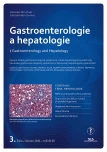-
Medical journals
- Career
Which non-steroidal anti-inflammatory drug should be used in patients with increased risk of gastrointestinal toxicity?
Commentary on CONDOR study
Authors: M. Bortlík 1,2; M. Lukáš 1,3
Authors‘ workplace: Klinické a výzkumné centrum pro střevní záněty, ISCARE a 1. LF UK v Praze 1; Interní klinika, 1. LF UK a ÚVN Praha 2; Ústav klinické biochemie a laboratorní diagnostiky, 1. LF UK v Praze 3
Published in: Gastroent Hepatol 2011; 65(3): 159-160
Category: Commentary
Sources
1. Lukáš M, Chalupná P, Adamec S et al. Adverse effects of non-steroidal antirheumatic agents on the digestive tract. Sb Lek 2002; 103(2): 265–272.
2. Ng SC, Chan FLK. NSAID-induced gastrointestinal and cardiovascular injury. Curr Opin Gastroenterol 2010; 26(6): 611–617.
3. Chan FKL, Lanas A, Scheiman J et al. Celecoxib versus omeprazole and diclofenac in patients with osteoarthritis and rheumatoid arthritis (CONDOR): a randomised trial. Lancet 2010; 376(9736): 173–179.
4. Spiegel BMR, Farid M, Dulai GS et al. Comparing rates of dyspepsia with coxibs vs NSAID+PPI: a meta-analysis. Am J Med 2006; 119(5): 448.
Labels
Paediatric gastroenterology Gastroenterology and hepatology Surgery
Article was published inGastroenterology and Hepatology

2011 Issue 3-
All articles in this issue
- Welcome on board!
- Importance of the United European Gastroenterology Federation increases and may set an example for political structures
- Hepatology in the third millennium
- Biochemical evaluation of the effect of silymarin and praziquantel on hepatic fibrogenesis during experimental larval infection of the parasitic helminth Mesocestoides vogae (Cestoda)
- Serum concentration of hyaluronic acid correlates with the degree of fibrosis and portal hypertension
- Radial endosonography vs. oesophagogastroduodenoscopy in detecting oesophageal and gastric varices
- Importance of portosystemic pressure gradient measurement (HVPG) in patients with liver cirrhosis
- Hepatocellular carcinoma – diagnosis and treatment from the medical oncology perspective
- Unusual complication of chronic pancreatitis
- Quantitative immunochemical fecal occult blood test in population screening of colorectal cancer
-
Which non-steroidal anti-inflammatory drug should be used in patients with increased risk of gastrointestinal toxicity?
Commentary on CONDOR study - Opinions on (intervention) treatment of acute pancreatitis are changing
- OTSC system training on porcine models
- American gastroenterology – is the situation worsening?
- Guidelines on the diagnosis and treatment of bleeding into the digestive tract caused by portal hypertension
- Gastroenterology and Hepatology
- Journal archive
- Current issue
- Online only
- About the journal
Most read in this issue- Importance of portosystemic pressure gradient measurement (HVPG) in patients with liver cirrhosis
- Hepatocellular carcinoma – diagnosis and treatment from the medical oncology perspective
- Unusual complication of chronic pancreatitis
- Serum concentration of hyaluronic acid correlates with the degree of fibrosis and portal hypertension
Login#ADS_BOTTOM_SCRIPTS#Forgotten passwordEnter the email address that you registered with. We will send you instructions on how to set a new password.
- Career

